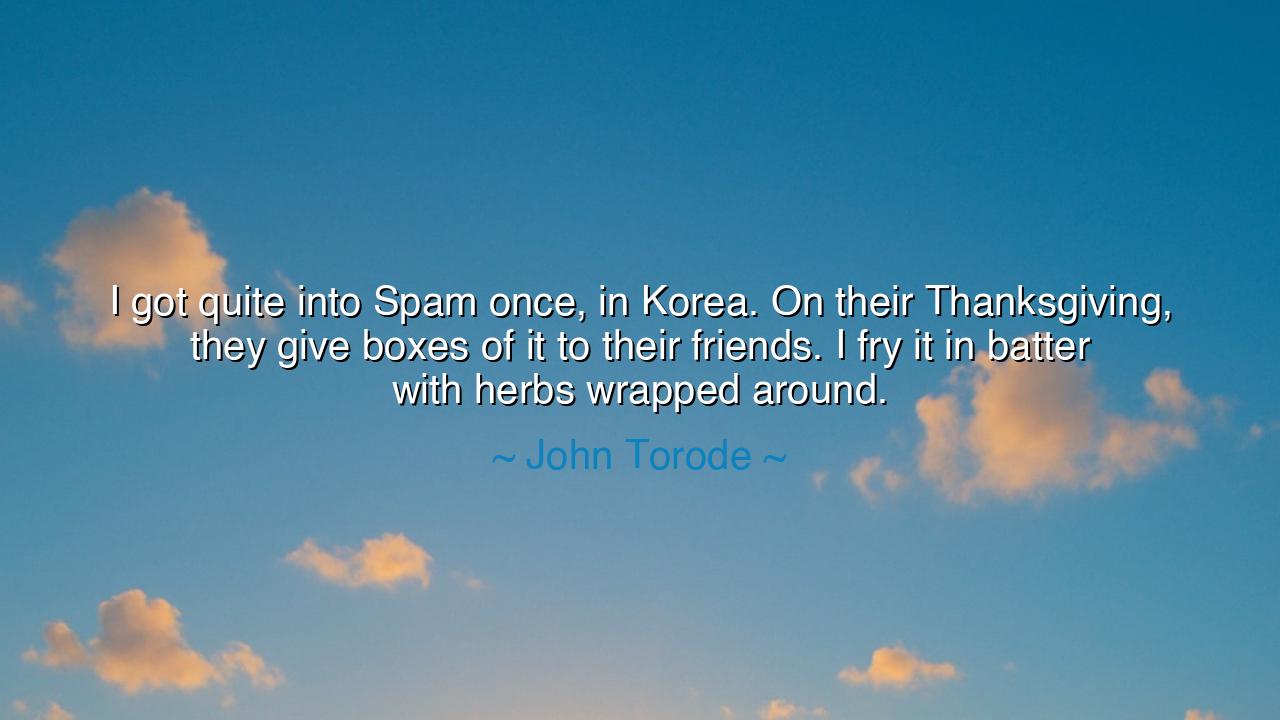
I got quite into Spam once, in Korea. On their Thanksgiving
I got quite into Spam once, in Korea. On their Thanksgiving, they give boxes of it to their friends. I fry it in batter with herbs wrapped around.






John Torode’s words—“I got quite into Spam once, in Korea. On their Thanksgiving, they give boxes of it to their friends. I fry it in batter with herbs wrapped around.”—speak not merely of food, but of the deep cultural meaning woven into even the humblest of dishes. What seems ordinary in one land may carry profound symbolism in another. In this reflection, Torode bears witness to the way tradition, gratitude, and hospitality can transform something simple into a gift of honor. Spam, born in war and scarcity, has become in Korea a token of affection, survival, and shared joy.
The origins of this practice lie in history. During the Korean War, when hunger stalked the land and supplies were scarce, Spam, brought by American soldiers, became both sustenance and treasure. What began as necessity was, over generations, reshaped into tradition, folded into the nation’s rhythms of Chuseok—the Korean Thanksgiving. To give a box of Spam is to say: I remember the hard times, I honor our survival, and I share with you the fruits of endurance. Thus, a once-humble can of meat carries with it a story of struggle and resilience.
Consider how similar patterns echo across the world. In ancient Rome, the poor shared coarse loaves of barley bread as tokens of goodwill. In Ireland, during the famine, families who had little would still offer a potato or a bowl of broth to a neighbor, for the act of giving was as important as the food itself. What mattered was not the richness of the gift, but the spirit of remembrance and generosity it embodied. Torode’s discovery of Spam in Korea is but a modern echo of these timeless truths—that food binds people together not just in body, but in memory and soul.
There is also something profound in the act of taking Spam, frying it in batter, and wrapping it with herbs. It is a lesson that the ordinary can be transformed by care and creativity. Just as the alchemist once sought to turn lead into gold, so too can the cook turn a simple canned meat into a dish of dignity. This transformation is a parable: it teaches that nothing is too humble to be honored, and no gift too small to be cherished, if it is offered with heart.
In Korea, the gift of Spam during Thanksgiving is not a joke, nor a novelty—it is a symbol. It tells us that tradition is not built upon luxury, but upon shared experiences, upon what a people endure together. What once fed the hungry in times of despair has become a gesture of respect in times of abundance. This teaches us to see beyond appearances, to recognize that what is mocked by one culture may be revered in another, carrying the weight of history.
The lesson here for future generations is clear: do not scorn the humble gift, nor the modest tradition. Cherish the ordinary, for it often conceals the most extraordinary stories. Look for the spirit behind the gesture, not merely the shape of the gift. If someone offers you bread, rice, or even a can of Spam, accept it with reverence, for it may carry with it generations of love, survival, and memory.
Therefore, let us live with open hearts, learning from every culture, honoring the ways in which people have turned struggle into strength. Let us also practice the art of transformation—taking what we are given, however modest, and making it beautiful with care. And above all, let us remember that true gratitude is not in the feast’s richness, but in the love that passes from hand to hand, family to family, nation to nation.
In John Torode’s words lies a teaching both simple and eternal: what is humble can become sacred, what is ordinary can become extraordinary, and what is shared becomes everlasting. Carry this wisdom forward, and may every meal you eat remind you not just of flavor, but of history, endurance, and the bonds that unite us across cultures and time.






AAdministratorAdministrator
Welcome, honored guests. Please leave a comment, we will respond soon